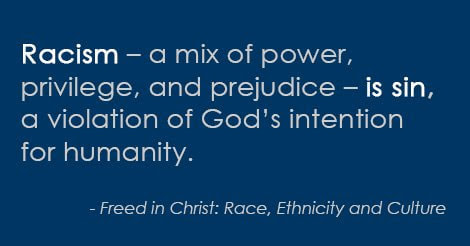Praying the News
|
RACISM AND WHITE SUPREMACY
While recent deaths of black and brown people have reignited public conversation around systemic racism and allyship, racism is not new or novel; in 1993, the Evangelical Lutheran Church in America published its social statement, “Freed in Christ: Race, Ethnicity and Culture.” (Read the whole statement.) How can I help? Listen. If you do not experience racism, listen without becoming defensive. Know that you have permission to be uncomfortable. You may not be responsible for the mistakes that were made by others, but you are responsible for the actions you take now. Find webinars and podcasts you can watch and listen to on the NC Synod website. Learn. Privilege is not a liberal invention. Privilege recognizes that in the United States, Christians can wear symbols of our religion without fear of hate- speech or blatant violence toward us. Other religious groups cannot. Privilege recognizes that in the United States, white people have the option of walking away or staying home from discussions about racism. People of color don't because they live in their skin all the time. The NC Synod has a racial justice network that invites Jesus followers to engage in learning and dialog together. Learn more at nclutheran.org and www.racialjusticenetworknc.org. Pray. Pray for healing and reconciliation. Pray for conversations and dialog between people who disagree about the scope of the problem and the ways to address racism and the education that is needed. Let us pray... O God, our emancipator, we lift before you the city of Charlottesville, especially victims of violence and those gathered in support of peace and equality. Give us courage to speak out against the sin of racism. Compel us to stand in solidarity. By your might, break the bondage that bigotry, hatred and violence impose on their victims and their perpetrators. Lord, in your mercy, hear our prayer. More prayer resources from our brothers and sisters in the United Methodist Church. |
RESPONDING TO VIOLENCE IN OUR WORLD
A Pastoral Letter on Violence adopted by the ELCA Conference of Bishops, March 4, 2013 "A voice is heard in Ramah, weeping and great mourning, Rachel weeping for her children and refusing to be comforted because they are no more." Jeremiah 31:15 and Matthew 2:18 Dear brothers and sisters in Christ: Every faithful caregiver who sits with victims of violence knows what we know - as God's church, we are called to reduce violence and should, in most cases, restrain ourselves from using violence. Whether or not statistics show that overall violence has declined in recent years, every person wounded or killed is a precious child of God. As bishops of the Evangelical Lutheran Church in America, we lament the tragedy of gun violence in our country. We are grieved by the way violence threatens and destroys life. We affirm the current soul-searching and shared striving to find a way to a better future. While the church grapples with this call to reduce violence and make our communities safer, we recognize that before God we are neither more righteous because we have guns nor are we more righteous when we favor significant restrictions. Brokenness and sin are not somehow outside of us. Even the best of us are capable of great evil. As people of God, we begin by confessing our own brokenness - revealed in both our actions and our failure to act. We trust that God will set us free and renew us in our life's work to love our neighbors. In this time of public attention to gun violence, local communities of faith have a unique opportunity to engage this work. As bishops, we were thankful to recognize the many resources our church has already developed (see below). We begin by listening: listening to God, to Scripture, and to each other. Providing a safe place for people to share their own stories, together we discern courses of action. Together we act. And together we return to listening - to assess the effectiveness of our efforts to reduce violence. In the Large Catechism, Luther says, "We must not kill, either by hand, heart, or word, by signs or gestures, or by aiding and abetting." Violence begins in the human heart. Words can harm or heal. To focus only on guns is to miss the depth of our vocation. Yet, guns and access are keys to the challenges we face. We recognize that we serve in different contexts and have different perspectives regarding what can and should be done. But as we live out our common vocations, knowing that the work will take many forms, we are committed to the work of reducing and restraining violence. This shared work is a sign of our unity in Christ. We invite you, our sisters and brothers, to join us in this work: The work of lament - creating safe space for naming, praying, grieving, caring for one another, and sharing the hope in God's promise of faithfulness The work of moral formation and discernment - listening to scripture, repenting, modeling conflict resolution in daily life, addressing bullying, conducting respectful conversations, and discerning constructive strategies to reduce violence The work of advocacy - acting to address the causes and effects of violence Knowing that we are not saved by this work, we undertake it trusting in Christ Jesus, who laid down his life for the world and who calls us to be peacemakers, to pursue justice, and to protect the vulnerable. In this, as in all things, Christ is with us. Thanks be to God. Download this letter. ELCA Resources for responding to violence ELCA Social Message on "Community Violence" |


